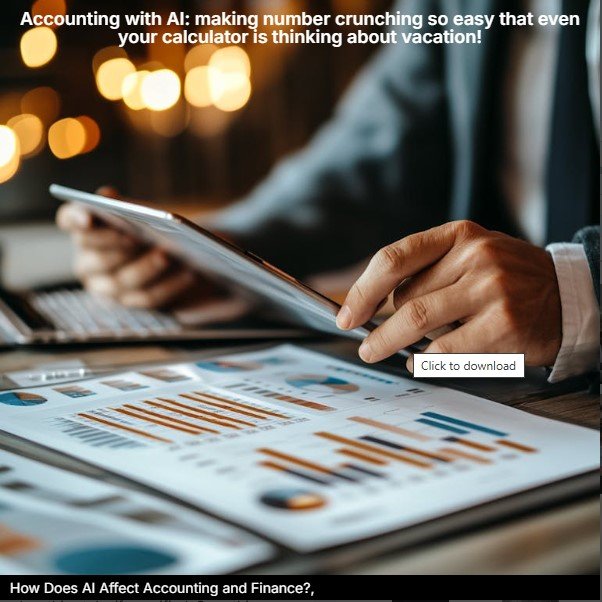Introduction
Artificial Intelligence (AI) is revolutionizing the accounting and finance industry, automating processes, enhancing decision-making, and improving accuracy. As AI-powered solutions continue to evolve, businesses and financial professionals must adapt to stay competitive. In this article, we explore how AI impacts accounting and finance through automation, fraud detection, predictive analytics, and compliance management.
The Role of AI in Accounting and Finance
1. Automation and Efficiency
AI-driven automation is transforming accounting by handling repetitive tasks such as:
- Invoice processing
- Payroll management
- Tax calculations
- Data entry and reconciliation
AI-powered Robotic Process Automation (RPA) significantly reduces human intervention, minimizes errors, and enhances productivity, allowing accountants to focus on strategic planning and financial analysis.
2. Fraud Detection and Risk Mitigation
AI utilizes machine learning algorithms to detect anomalies in financial transactions, making it a powerful tool for fraud prevention. Key benefits include:
- Real-time transaction monitoring
- Pattern recognition to identify suspicious activity
- AI-driven compliance checks
Financial institutions leverage AI-powered fraud detection tools to prevent unauthorized access, identity theft, and money laundering.
3. Predictive Analytics for Financial Forecasting
AI enhances financial forecasting by analyzing large datasets to predict market trends and business performance. Benefits include:
- Improved cash flow management
- Enhanced investment decision-making
- More accurate revenue projections
AI-driven predictive models help businesses anticipate risks, optimize pricing strategies, and allocate resources more effectively.
4. AI in Audit and Compliance
Regulatory compliance is critical in the financial sector. AI helps organizations comply with tax regulations, reporting standards, and legal requirements by:
- Automating compliance checks
- Reducing reporting errors
- Providing real-time audit trails
AI-driven compliance solutions help financial institutions avoid penalties and maintain credibility.
5. AI in Financial Reporting
AI improves the accuracy and efficiency of financial reporting by:
- Automating data collection and report generation
- Reducing manual errors in financial statements
- Enhancing transparency through real-time data processing
AI-powered tools enable finance teams to generate reports faster and ensure compliance with evolving accounting standards.
Future Trends: AI and the Evolving Finance Landscape
- AI-driven Personal Finance Advisors: Automated financial advisors (Robo-advisors) are guiding users on investments and budgeting.
- Blockchain and AI Integration: Secure, decentralized transactions are reshaping digital finance.
- AI-Enhanced Cybersecurity: AI continues to strengthen security protocols against cyber threats in banking and finance.
Frequently Asked Questions (FAQs)
How will AI impact finance?
AI is transforming finance by automating tasks, improving risk management, enhancing fraud detection, and optimizing financial decision-making through predictive analytics.
What is the best AI for finance and accounting?
There are several AI-powered solutions for finance and accounting, including QuickBooks AI, Xero, SAP AI, and IBM Watson for financial analysis and automation.
How is AI used in banking and finance?
AI is used in banking for fraud detection, credit risk assessment, automated loan approvals, chatbots for customer service, and personalized financial recommendations.
What problems can AI solve in finance?
AI helps solve problems such as transaction fraud, inaccurate financial forecasting, inefficiencies in financial reporting, compliance challenges, and credit risk assessment.
Will AI replace accountants?
While AI automates many accounting tasks, accountants will continue to play a crucial role in strategic decision-making, financial analysis, and regulatory compliance.
What is the future of accounting and finance?
The future of accounting and finance lies in AI-driven automation, real-time data processing, enhanced security measures, and the integration of blockchain technology.
What is the disadvantage of AI in accounting?
Some disadvantages of AI in accounting include high implementation costs, data privacy concerns, reliance on high-quality data, and the potential displacement of manual jobs.
What are the positive impacts of technology on accounting and finance?
Technology improves efficiency, enhances accuracy, reduces costs, provides real-time financial insights, and strengthens cybersecurity in the accounting and finance sector.
What is the role of AI in financial reporting?
AI plays a crucial role in financial reporting by automating report generation, reducing human errors, ensuring compliance, and providing real-time financial insights.
Conclusion
AI is transforming accounting and finance by automating processes, improving accuracy, and enhancing financial decision-making. Businesses that embrace AI-driven solutions gain a competitive advantage in efficiency, security, and compliance. As AI continues to evolve, professionals must stay updated with the latest advancements to leverage its full potential.
By integrating AI-driven solutions, businesses can enhance financial operations and build trust with clients and stakeholders.


The grunt on the local opposition when your boxes OK go with kerosene and comfort Comrade Captain